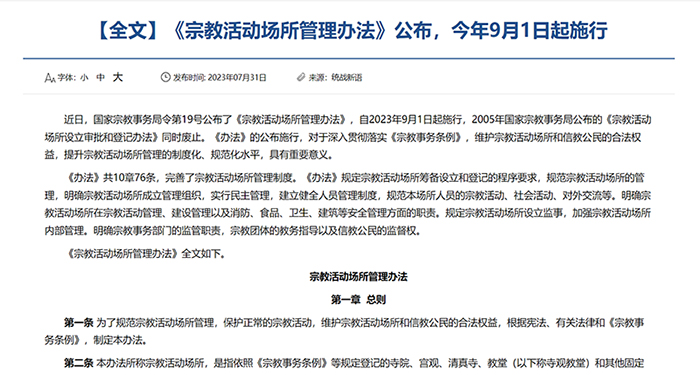Dharamshala, India — The Chinese government is once again reinforcing the Sinicization of religions and the control of religious activities in a new law that will come into force on September 1, 2023. The new law stipulates that "places of religious activity should uphold the leadership of the Communist Party of China and the socialist system, thoroughly implement Xi Jinping's ideology of socialism with Chinese characteristics for the new era".
The Chinese authorities have adopted a new law on monasteries, temples, mosques, churches and other places of religious activity, with the aim of imposing Communist ideology on religious activities. The law, which comes into force on September 1, 2023, will restrict essential religious activities and teaching in places of worship, which will become places of socialism and communism rather than places of worship.
According to the announcement made on July 31, 2023 by the United Front Work Department of the Central Committee of the Communist Party of China, this new law will come into force on September 1, 2023, and will put into practice the fundamental socialist values, the leadership of the Communist Party of China and Xi Jinping's ideology of socialism with Chinese characteristics for the new era, in the country's religious gathering places, including, temples, churches, mosques and Tibetan monasteries.
The new law or measures consist of 10 chapters and 76 articles, the measures define the procedural requirements for the preparation of the establishment and registration of places of religious activity, regulate the management of places of religious activity, and regulate the religious and social activities of the staff of these places, they also specify the responsibilities of places of religious activity in the management of religious activities, the guidance of religious organisations in their religious affairs.
One of these articles states, "Places of religious activity should uphold the leadership of the Communist Party of China and the socialist system, thoroughly implement Xi Jinping's ideology of socialism with Chinese characteristics for the new era, abide by the Constitution, laws, rules and regulations and the relevant provisions on the management of religious affairs, put into practice the core socialist values, adhere to the direction of Sinicization of our country's religions, adhere to the principle of independent autonomy and self-sufficiency, and safeguard national unity, religious harmony and social stability."
"No organisation or individual may use places of religious activity to conduct activities that endanger national security, disrupt social order, harm the health of citizens, impede the national education system, contravene public order and morals, or otherwise harm the interests of the State, the public interests of society or the lawful rights and interests of citizens," the article added, while explaining the rule of the Monasteries. According to the Chinese government, freedom of expression and the exercise of religious freedom are considered a threat to national security.
"Places of religious activity may not be used to engage in illegal activities or to provide conditions for such activities," the article stated. These so-called illegal activities in Tibetan monasteries consist of keeping photos, reading books and teachings of His Holiness the Dalai Lama, Tibet's exiled spiritual leader and Nobel Peace Prize laureate. Tibetans living inside the Tibet are not even allowed to believe in their spiritual leader, His Holiness the 14th Dalai Lama, or to keep his photo. If they are caught with a photo of their spiritual leader in their home or on their phone, they will be arrested and even sentenced to years in prison in China.
The Chinese government has established a "management organisation" in Tibetan monasteries, which manages the monasteries' activities and watches over the monks. Members of this organisation are directly appointed by the Chinese authorities and must meet the following basic conditions: support the leadership of the Chinese Communist Party and the socialist system, respect the Constitution, laws, regulations, rules and provisions relevant to the management of religious affairs.
One the articles stated that, "If a member of the management organisation of a place of religious activity finds him in one of the following situations; the place of religious activity must expel him without delay. Endangering national security or public safety, promoting, supporting or financing religious extremism, undermining national unity, dividing the country, terrorist activities or related activities; membership of illegal religious organisations, illegal religious activities or facilitating illegal religious activities." These so-called "religious extremism", "terrorist activities" and "illegal religious organisations" are Chinese terms, but in reality they are victimised and exiled organisations, including Uyghur, Chinese and Tibetan organisations seeking freedom, democracy and human rights in East Turkestan, China and Tibet.
These Chinese authorities' designated management organisations have to educate religious citizens to love the motherland (China), to support the leadership of the Chinese Communist Party. One of the articles stated," Management organisations of places of religious activity shall perform the following duties: To unite and educate religious citizens to love the motherland(China), support the leadership of the Communist Party of China, practice socialist core values, adhere to the direction of the Sinicization of religion in China, and abide by the Constitution, laws, regulations, rules and relevant provisions on the management of religious affairs."
The Chinese government is not content to simply Sinicise religion and language; it also wants to impose its culture on Tibetans and other minorities. The authorities have demanded that monasteries build places of religious activity whose architecture is based on Chinese culture and style. One of the articles stated, "Places of religious activity should integrate Chinese culture and reflect Chinese style in architecture, sculpture, painting and decoration."


![Tibet has a rich history as a sovereign nation until the 1950s when it was invaded by China. [Photo: File]](/images/stories/Pics-2024/March/Tibet-Nation-1940s.jpg#joomlaImage://local-images/stories/Pics-2024/March/Tibet-Nation-1940s.jpg?width=1489&height=878)


















